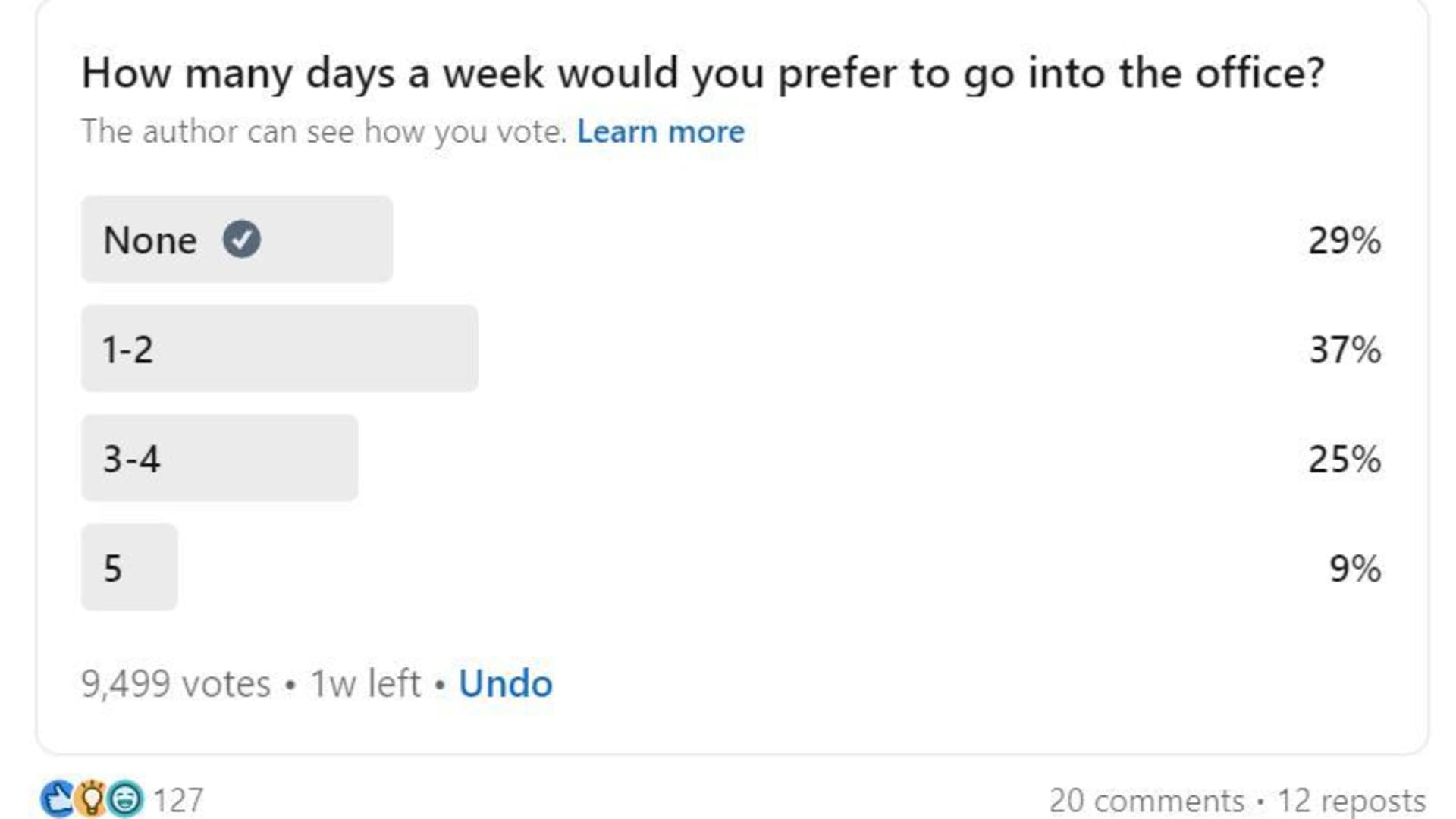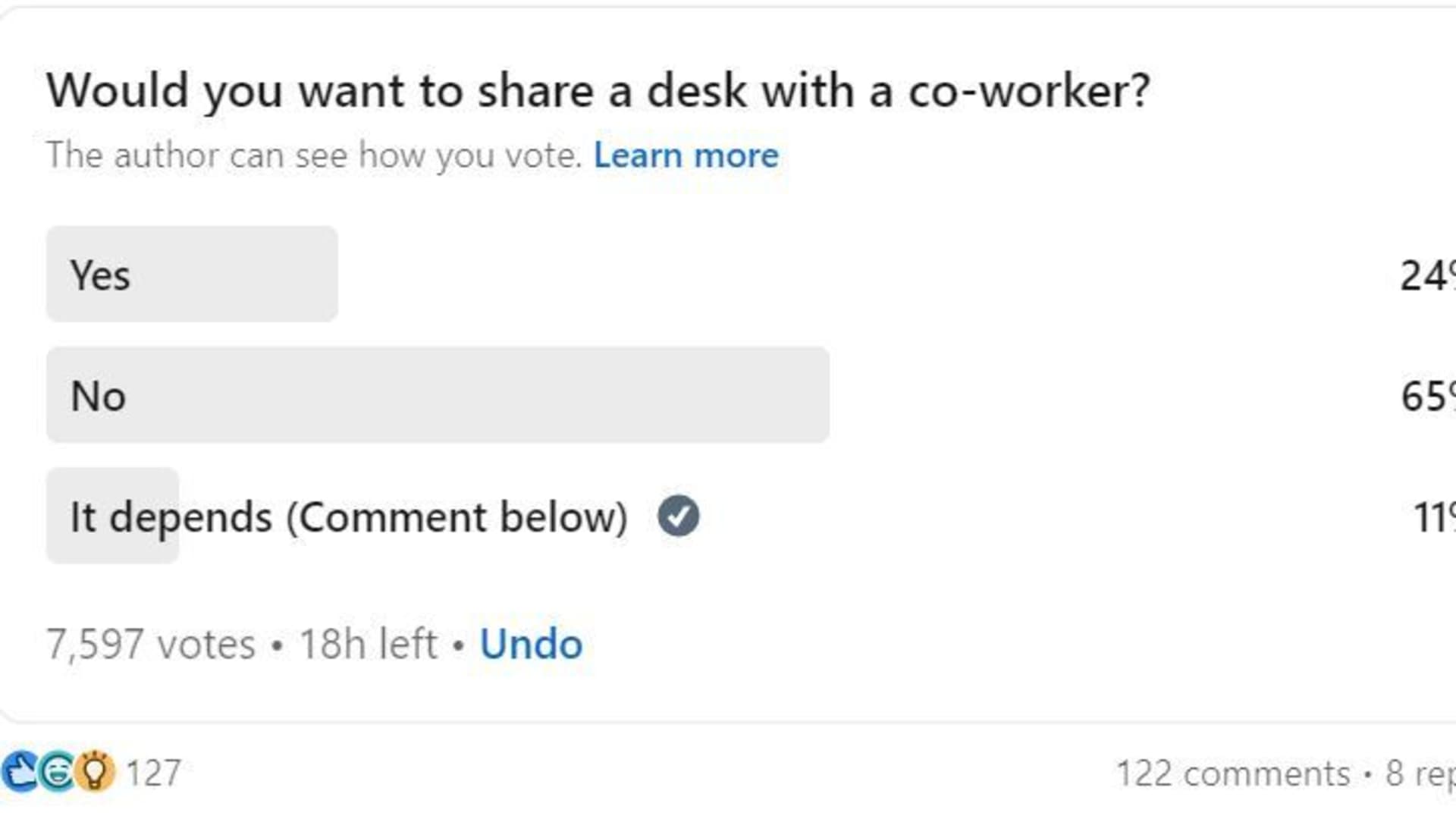
This was adapted from CNBC's Work It newsletter on LinkedIn about all things work — from how to land the job to how to succeed in your career. Click here to subscribe.
A lot of companies have been gradually beating the return-to-office drum in the past year — and it's been met with mixed reactions.
Some people have enjoyed the return to in-person collaboration while others don't want to give up the flexibility and comfort that the WFH-in-your-PJs lifestyle brought. And, of course, some people have been here the whole time. (We see you.)
Companies have tried to figure out how to best roll out these policies, but it hasn't always gone smoothly.
Get Connecticut local news, weather forecasts and entertainment stories to your inbox. Sign up for NBC Connecticut newsletters.
Amazon CEO Andy Jassy announced recently that employees would be expected to return to the office three days a week in the spring. That same day, employees created a Slack channel to vent their frustrations. In less than a week, 14,000 employees had joined the Slack channel and a petition started circulating, demanding the company retract the policy.
Based on some of the feedback that has emerged on Slack, Reddit and elsewhere, it seems a lot of employees felt blindsided by the announcement.
The petition used language like the RTO mandate "shattered their trust" in management and some have speculated that this was perhaps a way to get more people to quit. The news of the RTO mandate came less than a month after the company announced plans to lay off 18,000 workers.
Money Report
This is all made more awkward by the fact that a lot of non-office employees — like Amazon drivers and warehouse workers — have not had any break in their routines.
There are employees at pretty much every company who genuinely like and/or want to go to the office. Maybe they don't have a good, quiet place to work at home. Maybe things are stressful at home. Or maybe they just like having some place to go.
The backlash at Amazon and elsewhere seems to be based on employees feeling surprised by RTO mandates and misled that flexible work from home or hybrid options would always be there. For example, what do you tell people who relocated and bought houses in other cities based on a promise that there would be flexible options?
In January, Disney issued its own RTO mandate only they went one up and made it FOUR days a week in the office. There was swift backlash from employees and they, too, circulated a petition demanding the company retract the mandate.
General Motors, Starbucks, Apple and Twitter are among other big companies that have started calling employees back to the office. Initially, it looked like it was working. But now, it's not so clear.
"On-site work requirements are being reintroduced, but employers are walking them back because employees are increasingly unwilling to comply with those requirements, and organizations are unsure or reluctant about how to enforce them, even though they're technically in place," Caitlin Duffy, director of research at Gartner, told CNBC Make It.

That uncertainty started to show up in the data last month. The percentage of workers coming back to the office had been steadily climbing over the past year but it dropped to 50% in January from 55% in November, according to LinkedIn research. During that same time, the number of remote workers actually ticked up to 28% from 25%. About 18% of workers are currently working a hybrid schedule.
One month does not a trend make — this could be a seasonal or one-off thing. But it has made some experts wonder if the backlash is causing some companies to pump the brakes on RTO plans so they don't face a mass exodus of employees.
Employees resist RTO mandates
Employers are doing their best to really sell RTO, marketing it to employees using words like collaboration, socialization and free snacks. But a lot of employees have found benefits and balance in working from home, while still being productive. Their messaging uses words like home, kids and yoga pants.
Nearly 7 out of 10 workers (68%) said they would rather quit than return to office in a survey by financial consulting firm Clarify Capital.
The biggest annoyance? Commuting to work (45%), followed by getting home later (44%). People also cited having to spend more money on lunch and work attire, having to WEAR work attire, not being home with their kids and pets, and being expected to socialize with co-workers.
More than one-quarter (27%) said they would try to negotiate higher pay if asked to return to the office.
In the Amazon petition, employees cited internal data that most employees preferred to work remotely with maybe a monthly meet-up or, at most, be in the office one or two days a week, according to The Washington Post.
CNBC is conducting its own informal poll on LinkedIn and the results are similar: So far, around 29% have said they wanted to work fully remotely, while 37% said only 1-2 days a week. Take the poll and share your thoughts in the comments.

It seems like the hardest part of all this is the "mandate" part — employees would prefer just having the choice to come in as opposed to a rigid requirement.
So, what's next? Will companies just continue to gradually increase the number of days that workers have to go back despite employee protests and just let the chips fall where they may (i.e., some employees will quit)?
Nick Bloom, a Stanford economics professor who researches work-from-home topics, said he doesn't ever see employees going back to five days a week in the office.
"Professionals and managers are not going back to five days a week for the simple reason it is not profitable for firms to do this," Bloom said. "Employees are a lot happier if they work from home one or two days a week so that boosts recruitment and retention. They also appear more productive if they have one or two days a week, typically Friday and Monday, of quieter home time to work and avoid long stressful commutes."
Bloom noted that pretty much all of the companies announcing return-to-office policies are making it two, three or four days — few are actually saying you need to be in five days a week.
Bloom has been at this WFH study since long before the pandemic. In a 2015 study, Bloom and a few other researchers found that call center workers at a Chinese travel agency, who were randomly assigned to work from home or the office for nine months, were actually more productive when they were working from home.
That study was about employees doing repetitive tasks that can be easily monitored, Bloom explained.
"These kinds of employees are typically now working fully remote, folks like HR, payroll, IT support, etc." Bloom said. "But managers and professionals, who are normally university graduates, tend to work more in teams in more creative roles and they are standardizing towards hybrid with usually three days a week in the office."
This isn't to discount the benefit of in-person collaboration.
"Some of the best learning I've ever had came from mentors I interacted with once a month in person. Some of the best collaborations I've ever had were working with teams that would come together for three or four days, and then go divide and conquer," Adam Grant, a professor of organizational psychology at the Wharton School of the University of Pennsylvania, told the Wall Street Journal in a recent interview.
"[T]he reality is, if you look at [Stanford professor] Nick Bloom's research, data shows people are more likely to stay in a hybrid structure. They can perform just as well if they are only in the office half the week, and in many cases, better, because flexibility is motivating."
Google's solution: Share a desk
Google's cloud unit had a cost-effective, slightly gross solution to this whole hybrid conundrum: They said OK, you only have to come to the office two days a week — Monday and Wednesday or Tuesday and Thursday. The catch is, you have to share a desk.
They really made it sound doable, too: "Through the matching process, they will agree on a basic desk setup and establish norms with their desk partner and teams to ensure a positive experience in the new shared environment."
I feel like there's just one slight problem in that logic: How do you handle that? Do you pair sloppy people with other sloppy people? Do you make everyone pack in and pack out their equipment like we're camping and then give it a hazmat treatment in between to disinfect it?
I don't consider myself a slob per se, but I certainly wouldn't want to share a desk with me. There are crumbs and spills and dog hair. Then there's the whole idea of touching shared surfaces. Let's say Mr. Monday-Wednesday has a cold or a virus or something. The other co-worker could potentially have that by Thursday and now you've got two people out. What does that do to productivity?
We did a poll on that, too, just to read the room. It turns out, most people are not interested: 65% said they would not want to share a desk.

I would say this: If I only had to come into the office like once or twice a month, I would consider sharing a desk — though contingent on having a great cleaning staff that hoses that stuff down like the future of humanity depends on it.
Whatever the permutation, Bloom says hybrid work-from-home schedules are here to stay.
"Hybrid WFH has become totally dominant as it's a win-win situation. It makes firms more money as they save a lot on recruitment, retention and payroll costs and see higher productivity," Bloom said. "It makes employees happier as they avoid commuting twice a week, which we know from surveys going back 20 years is the most unpleasant part of the typical person's day, even worse than being at work. So this is here to stay and it is good for firms and employees."
What do you think about the future of work? Do you think employers will start to back off of return-to-office mandates and offer more flexible, hybrid schedules? Or do you think it's full-steam ahead, everyone get on the back-to-work train? Would you be willing to share a desk if it meant less time in the office? Share your thoughts with us on LinkedIn.
More from CNBC:
- Getting workers engaged and in the office again takes empathy and experimentation
- Hybrid workers earn more than remote and in-person workers, according to new research
- 64% of women say they could do their boss's job better than them
- The smartest question to ask in a job interview, according to a CEO who's interviewed hundreds
- This 26-year-old pays $0 to live in a 'luxury tiny home' she built for $35,000 in her backyard—take a look inside
- The 10 worst-paying college majors, five years after graduation
— With reporting by Annie Palmer, Alex Sherman, Sarah Whitten and Jennifer Liu.
Want more tips to help you navigate your career? Sign up for CNBC Make It newsletters.






